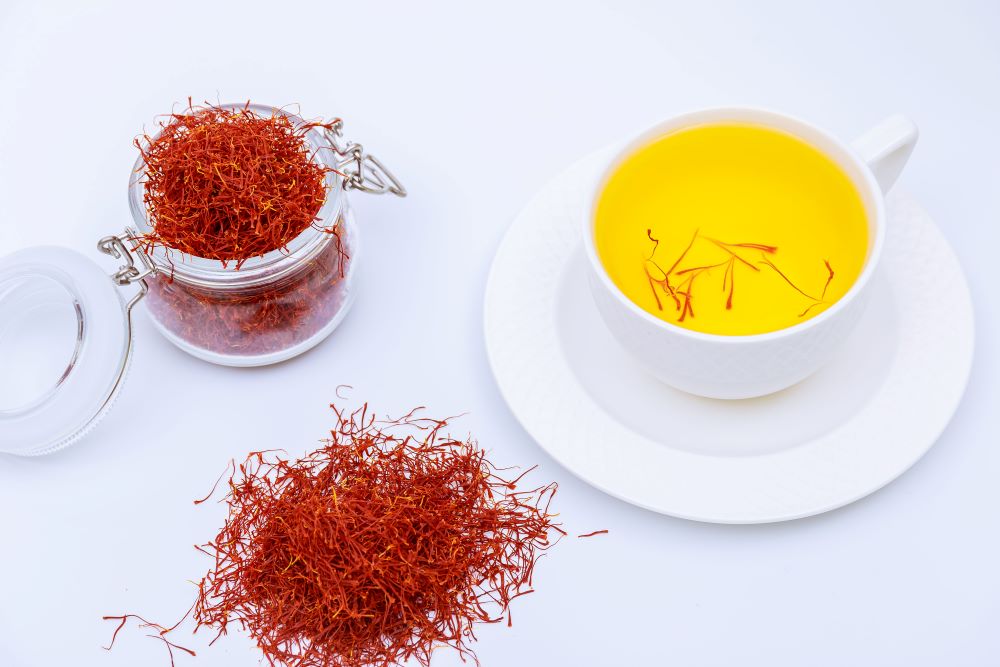The fact that Saffron has an abundant store of bioactive substances can be considered good for one’s health. There are various health benefits of saffron. Some of these are discussed here.
1. Acts as a Powerful Antioxidant
Saffron is rich in an impressive variety of plant compounds, which makes it a potent antioxidant. It can fight cell damage and help improve your overall health conditions. In addition, a recent study has shown that saffron's antioxidant properties can benefit your brain and nervous system.
Some notable antioxidants in saffron include crocin, crocetin, safranal and kaempferol. These come with antidepressant properties and help protect brain cells and stimulate brain functions and memories. Moreover, these are linked with reduced inflammation and anticancer properties.
2. Improves Mental Health
Saffron is the sunshine spice that can lighten up your mood. Depression is a common mental health issue which can lead to various health complications. However, according to research, saffron is considered more effective than placebos when it comes to treating the symptoms of mild-to-moderate depression.
Another study in this field noted that a daily intake of 30 mg of saffron could provide conventional treatment for depression. In addition, if you are experiencing stress or low mood, saffron consumption will likely help you develop a lighter and healthier mood.
3. Helps Treat Cancer
Saffron is rich in antioxidants, which help it to neutralise harmful free radicals in your body. The damages caused by such radicals often result in cancer, which can be prevented with saffron. A recent test-tube study proves that saffron and its compounds can contribute to killing colon cancer cells or suppress their growth, making sure that the healthy cells are unharmed.
A similar effect is also seen in the case of cancer in other body parts, like bone marrow, skin, prostate, breast, lung, cervix, and others. In addition, saffron is rich in carotenoids, such as crocin and crocetin, which contain potent antitumor effects. Moreover, saffron can also make cancer cells more sensitive to chemotherapy drugs.
4. Reduces PMS Symptoms
Premenstrual syndrome (PMS) refers to the specific conditions that occur before a menstrual period in women. These include physical, emotional, and psychological symptoms in them. Commonly, women are likely to experience pelvic pain, acne and pimples, headache, cravings, anxiety, depression and mood swings.
According to a study, women between 20 and 45 years should consider taking about 30mg of saffron daily. It will be more effective than a placebo for controlling PMS problems and symptoms. In addition, herbal medicine containing saffron can relieve women from primary dysmenorrhea.
5. Acts as an Aphrodisiac
Food supplements for boosting your libido are aphrodisiacs. Saffron contains aphrodisiac properties, which can be effective for people who are taking antidepressants.
Another study, a review of multiple research papers, shows that saffron can significantly improve erectile function, libido, and sexual satisfaction for men. Moreover, it can be effective in treating sex-related pain in women.
6. Helps to Lose Weight
Gaining weight can be a serious issue with various physical complications. A common factor that can cause weight gain is frequent snacking and craving fast food. Saffron has properties that can reduce your appetite and curb your cravings. If you avoid snacking frequently or consume fast food, you will be less likely to gain weight.
A study conducted among women confirms this. The participants were allowed to take saffron supplements daily for about eight weeks. After this period, the participants felt fuller with every meal. They hardly felt the urge to consider snacking. In addition, they lost more weight than another group of women on a placebo.
7. Stimulates Brain Functions
Saffron has antioxidant and anti-inflammatory properties, which have therapeutic potential for brain functions and the nervous system. In addition, the saffron extract contains crocin, which can be beneficial for tertian age-related mental impairment.
For instance, the Japanese healthcare system uses capsules containing saffron extract to treat Parkinson's disease, memory loss and inflammation. However, the effectiveness of saffron for treating traumatic brain injury and brain ischemia is yet to be researched.
8. Treats Alzheimer’s Disease
Saffron is often considered a powerful component when treating mild to moderate Alzheimer's. Its antioxidant properties can stimulate brain functions, positively reflecting such diseases. In addition, it interacts with cholinergic and dopaminergic systems, which can contribute to treating Alzheimer’s or Parkinson’s.
A study found that saffron protects against free radical damage while moderating acetylcholinesterase (AChE) activity and reducing neurodegeneration, which contributes to treating Alzheimer’s. In addition, saffron's antioxidant and anti-inflammatory effects can help enhance your memory by stimulating brain functions. In this regard, patients with mild Alzheimer’s symptoms are likely to benefit from a daily intake of saffron.
9. Helps to Manage Inflammation and Arthritis
Arthritis is a severe health issue. A study conducted in Italy among lab rats shows that the crocetin content in saffron promotes cerebral oxygenation. This is beneficial for treating arthritis. In addition, the petals of the saffron plant and its extract have c effective anti-inflammatory properties. It contains tannins, flavonoids, alkaloids, and saponins. All of these can be effective in reducing arthritis pain and causing inflammation.
10. Boosts Eyesight
Saffron also has a role in strengthening your visionary health. It contains safranal, which is effective in preventing or delaying retinal degeneration. Moreover, this component can also reduce rod and cone photoreceptor loss. A delay of retinal degeneration in retinal pathologies benefits your visionary health.
Its benefits are also evident when it comes to age-related macular degeneration. In addition, saffron supplements can offer a significant improvement in retinal function. However, more research can be required in this regard.
11. Helps with Insomnia
Saffron might come with some soothing components that help develop a healthier sleep routine. For example, a recent study conducted among lab rats proves that crocin content in saffron helps to boost non-rapid eye movement sleep. 0%.
Moreover, as discussed earlier, saffron helps to improve mild symptoms of depression. Getting good sleep can be a good way of handling it, as insomnia can often intensify the symptoms of depression. Saffron supplements can help in this regard.
12. Boosts Immunity and Digestion
One of the best ways to improve health conditions is by enhancing immunity. Saffron contains carotenoids, which can have an impact on your immunity. A study conducted among men proves this possibility. Here the participants were given 100mg of saffron every day. In the end, the participants observed temporary immunomodulatory effects without any side effects.
Another benefit of saffron is in terms of digestion. Saffron comes with antioxidant, anticancer, anti-inflammatory, and anti-hyperlipidemic effects. A study conducted among animals revealed their benefit in digestive health. However, its impact on human beings is still unclear.
13. Improves Heart and Liver Health
Heart health depends on multiple factors. Clinical researchers believe that saffron contains antioxidant properties, reducing blood cholesterol levels. It also helps to prevent blood vessels and arteries from clogging. In addition, a test-tube study conducted among diabetic mice revealed that saffron could lower blood sugar levels and raise insulin sensitivity.
A study suggests that saffron supplements can benefit patients suffering from liver metastasis. Moreover, its carotenoid content inhibits the production of reactive oxygen species, which can help your body. Furthermore, it can protect your liver from external toxins. However, more research will be mandatory to prove this point.






















